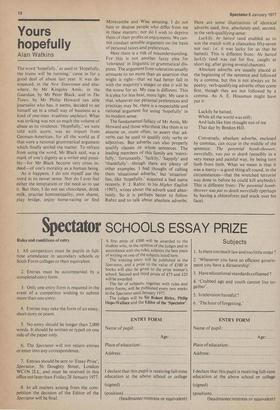Yours hopefully
Alan Watkins
The word 'hopefully,' as used in 'Hopefully, the trains will be running,' came in for a good deal of abuse last year. It was denounced, in the New Statesman and elsewhere, by Mr Kingsley Amis; in the Guardian, by Mr Peter Black, and in The Times, by Mr Philip Howard (an able journalist who has, it seems, decided to set himself up in a small way of business as a kind of one-man Academic anglaise). What was striking was not so much the volume of abuse as its virulence. 'Hopefully,' we were told with scorn, was an import from German-American, for all the world as if that were a rational grammatical argument which finally settled the matter. To refrain from using the word, Mr Black said, was a mark of one's dignity as a writer and possibly—for Mr Black became very cross indeed—of one's morality as a human being.
As it happens, I do not myself use the word in its newer sense. Nor do I ever feel either the temptation or the need so to use it. But then, I do not eat chocolates, drink milk, practise homosexuality, own shares, play bridge, enjoy horse-racing or find Morecambe and Wise amusing. I do not hate or despise people who differ from me in these matters; nor do I wish to deprive them of their profits or enjoyments. We cannot conduct sensible argument on the basis of personal tastes and preferences.
Here there is a risk of misunderstanding. For this is not another fuzzy plea for 'tolerance' in linguistic or grammatical disputes. The argument from toleration usually amounts to no more than an assertion that might is right—that we had better fall in with the majority's usages or else it will be the worse for us. My case is different. This is a, plea for less heat, more light. My case is that, whatever our personal preferences and practices may be, there is a respectable and rational argument for using 'hopefully' in its modern sense.
The fundamental fallacy of Mr Amis, Mr Howard and those who think like them is to assume or, more often, to assert that adverbs can be used to qualify only verbs or adjectives. But adverbs can also properly qualify clauses or whole sentences. The leading members of this family are 'mercifully,' fortunately,"luckily,"happily' and 'thankfully'—though there are plenty of other examples. I had thought of calling them 'situational adverbs,' but 'situation' has, like 'hopefully,' acquired a bad name recently. F. J. Rahtz, in his Higher English (1907), writes about the adverb used absolutely. So it is perhaps better to follow Rahtz and to talk about absolute adverbs.
Here are some illustrations of identical adverbs used, first, absolutely and, second, in the verb-qualifying sense:
Luckily, he hatted (and enabled us to win the match with a chanceless fifty-seven not out: i.e. it was lucky for us that he batted). This is different from: He hatted luckily (and was out for five, caught at short leg, after giving several chances).
Absolute adverbs are usually placed at the beginning of the sentence and follov.ed by a comma, but this is not always so. In poetry, verb-qualifying adverbs often come first, though they are not followed by a comma. As A. E. Housman might have put it:


































 Previous page
Previous page